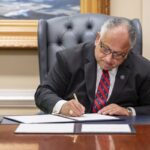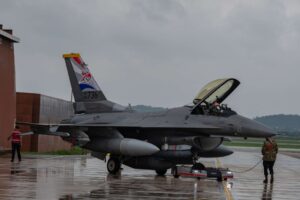China on Thursday (Jun 2) said it “firmly opposes” trade talks between the United States and Taiwan after Taipei and Washington announced the launch of a new initiative to deepen economic ties.
Beijing claims Taiwan as part of its territory and tries to keep it isolated on the world stage, bristling at any attempt to treat the self-governing democracy as an independent nation.
“China always opposes any form of official exchanges between any country and the Taiwan region of China, including negotiating and signing any economic and trade agreements with sovereign connotations and an official nature,” commerce ministry spokesman Gao Feng said.
Washington is vying to bolster its influence in the region to counter Beijing and US President Joe Biden is coming under bipartisan pressure from US lawmakers to deepen ties with Taiwan.
The talks announced on Wednesday – the US-Taiwan Initiative on 21st-Century Trade – come on the heels of a trade agreement announced last week between the United States and 12 Asian economies, which excluded Taiwan.
Like the earlier trade agreement, the discussions with Taiwan will not involve tariffs or market access – items that would require congressional approval, US officials said.
In a statement, the US Trade Representative said that “both sides will work at pace … to develop an ambitious roadmap for negotiations for reaching agreements with high-standard commitments and economically meaningful outcomes”.
‘Historic Breakthrough’
Taiwan’s lead trade negotiator John Deng said the talks would “open up more room for economic cooperation”.
“We can say this is a historic breakthrough,” he added, speaking at a press conference in Taipei.
Deputy USTR Sarah Bianchi and Deng met on Wednesday to launch the new initiative.
The trade agency said it was “intended to develop concrete ways to deepen the economic and trade relationship, advance mutual trade priorities based on shared values, and promote innovation and inclusive economic growth for our workers and businesses”.
The first meeting under the initiative will be held in Washington later in June, and will cover customs procedures and regulations, including rules governing agriculture trade, worker rights and the fight against “harmful non-market policies”.
Another administration official said the goal is to produce a “high framework, binding agreement”, but gave no timeframe for reaching a deal.
Taiwan is the 10th largest export market for the United States, as well as a vital source of semiconductors, including some of the most advanced and smallest microchips in production.
A global shortage of semiconductors is hitting industries that rely on them from cars to smartphones, and pushing inflation higher.
A spokesman for the Taiwanese government on Wednesday emphasised the “crucial role” the island plays in the semiconductor supply line.
“In light of the increasing trade conflict between China and the US, and also the fallout from the COVID-19 pandemic to the world’s economy … the US government has realised that it needs to strengthen the economic and political links with Taiwan to ensure the stability and safety of the supply chain,” Lo Ping-cheng added.
The US Commerce Department has launched a separate dialogue with Taipei on tech and investment – two other areas covered by IPEF.
‘Robust’ Relathionship
Taiwan is a rare bipartisan issue in Washington, and a cross-party group of 52 senators had urged Biden to include the island in last week’s Indo-Pacific Economic Framework (IPEF), which includes about 40 per cent of the global economy.
They argued in a letter to Biden that leaving an important trading partner out would “allow the Chinese government to claim that the international community does not in fact support meaningful engagement with Taiwan”.
A senior official said there is still time to add Taiwan to that effort.
“We didn’t include Taiwan in the initial launch. However, going forward, we intend to take a flexible and adaptable approach to IPEF participation,” the official told reporters.
The official reiterated Washington’s “long-standing one China policy”, but said the Biden administration also maintains a “robust unofficial relationship with Taiwan and … is committed to deepening it”.
Bipartisan support for Taiwan has been fuelled in part by China’s increasingly aggressive stance towards the island under President Xi Jinping.
On Monday, China made its second-largest incursion into Taiwan’s air defence zone this year, with Taipei reporting 30 aircraft entering the area.
So far in 2022 Taiwan has reported 465 such incursions, a near 50 per cent increase on the same period last year, according to an AFP database.
Source : CNA
















